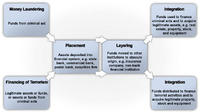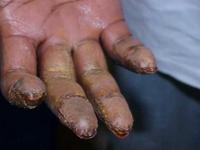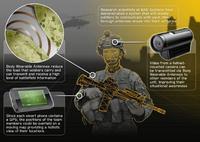-
Japan nuke accident halves nuclear power growth
The nuclear meltdown at the Fukushima Daiichi plant appears to have caused nations around the world to reconsider nuclear projects; following the accident, demand for future nuclear projects has been halved
-
-
Security companies' fortunes continue to rise post 9/11
Thanks to the flurry of security spending in the past decade, companies like Rapiscan have seen profits skyrocket as they struggle to keep pace with demand; the California based company, which manufactures security screening systems for passengers and cargo, has grown from 200 employees to 800 as orders from DHS poured in for screening systems at airports, sea ports, and borders
-
-
SAIC wins $38 million task order
On Thursday, defense giant SAIC announced that it had been awarded a $38 million task order by the U.S. Naval Surface Warfare Center (NSWC) Crane division to provide systems engineering and lifecycle integration support for DHS and other federal agencies
-
-
Man-made silk mimics spider silk

Spider silk has attracted human interest for thousands of years due to its toughness and ductility; as with most biomaterials, spider silk has evolved over millions of years resulting in a combination of properties that far exceeds any man-made material; until now
-
-
Severe drought in Georgia, 150 counties declared disaster areas
A severe drought and excessive heat has forced the U.S. Department of Agriculture to declare 150 counties in Georgia as primary natural disaster areas; the drought began on 15 April and has caused farmers to lose more than 30 percent of their pasture, grain crops, cotton, peanuts, tobacco, and forage crops
-
-
Combating the financing of terrorism

Terrorist organizations rely on financing and support networks to sustain operations and launch attacks. The U.S. Department of the Treasury has developed a sophisticated and comprehensive approach to identify, disrupt, and deter the funding networks of terrorist organizations
-
-
Sea level rise to take economic toll on California coast
California beach towns could face hefty economic losses caused by sea level rise, according to a new state-commissioned study; the study estimates the cost of coastal storm damage and erosion, both of which are expected to increase as sea levels rise
-
-
New technology detects altered fingerprints

The widespread use of fingerprint recognition systems has led some individuals to disfigure or surgically change their fingerprints to mask their identities; new technology can help law enforcement and border control officials detect these altered fingerprints
-
-
Emergency cleanup plans for potential Cuban oil spill
With Cuba set to begin offshore drilling, the former head of the Environmental Protection Agency (EPA) is pressing the United States to immediately begin developing emergency plans to assist Cuba in the event of a major oil spill
-
-
$1.1 million order for Implant Sciences' portable explosives detectors
Implant Sciences Corporation, a developer of explosives detection technology, recently announced that it had received a $1.1 million order for its portable explosives detection systems; with the latest purchase, Implant Sciences will supply its Quantum Sniffer QS H-150 portable devices to the Middle East for use by critical infrastructure operators
-
-
General Dynamics to integrate CBRN device in Army radios
General Dynamics C4 Systems announced last week that it will work with U.S. Army researchers to install wireless-networking chips on radios that can also detect the presence of dangerous chemicals on the battlefield
-
-
Body wearable antennas for soldiers, first responders

Body Wearable Antennas (BWAs) allow soldiers to communicate with their colleagues on the front line without the need for conventional radio whip-antennas which can be cumbersome and conspicuous; NWS can also be incorporate into the suits of fire-fighters for use during search and rescue, for police patrol team members to have the GPS locations of their colleagues, and in other hazardous industries such as mining, oil, and gas
-
-
Doppelganger Domains threaten 30 percent of Fortune 500 companies
30 percent of Fortune 500 companies are vulnerable to Doppelganger Domains attacks; a Doppelganger Domain is a domain spelled identically to a legitimate fully qualified domain name (FQDN) but missing the dot between host/subdomain and domain, to be used for malicious purposes
-
-
9/11 generates growth of homeland security college programs

The 9/11 attacks led to a flurry of spending not only on defense and homeland security needs, but also education; in recent years dozens of homeland security programs have emerged at community colleges, universities, and graduate schools across the country and thousands of students have flocked to these new programs lured by the promise of jobs
-
-
Decade after 9/11, infrastructure interdependence a major problem for U.S.
After years of study of the impact on infrastructure of the 9/11 attacks, a groups of experts paints a disconcerting picture of major infrastructure systems that were highly dependent upon one another; even today, these experts see this deep interdependency as a liability and threat to national security and the quality of life for its citizens
-
More headlines
The long view
Factories First: Winning the Drone War Before It Starts
Wars are won by factories before they are won on the battlefield,Martin C. Feldmann writes, noting that the United States lacks the manufacturing depth for the coming drone age. Rectifying this situation “will take far more than procurement tweaks,” Feldmann writes. “It demands a national-level, wartime-scale industrial mobilization.”
Trump Is Fast-Tracking New Coal Mines — Even When They Don’t Make Economic Sense
In Appalachian Tennessee, mines shut down and couldn’t pay their debts. Now a new one is opening under the guise of an “energy emergency.”
Smaller Nuclear Reactors Spark Renewed Interest in a Once-Shunned Energy Source
In the past two years, half the states have taken action to promote nuclear power, from creating nuclear task forces to integrating nuclear into long-term energy plans.
